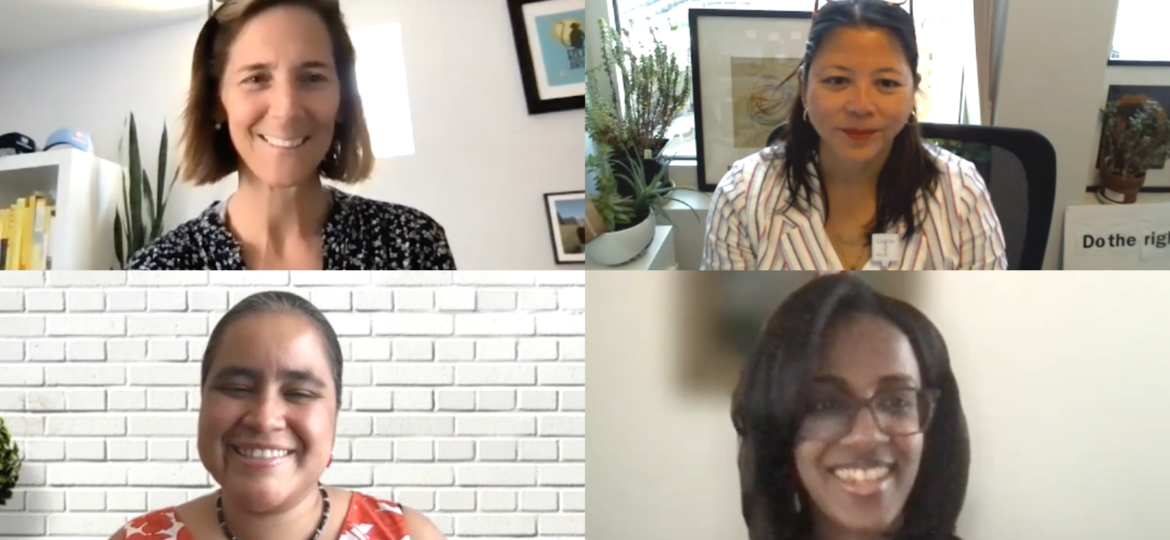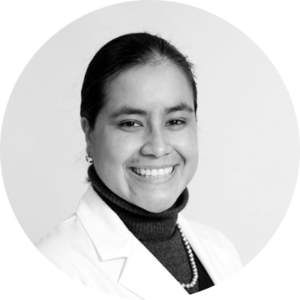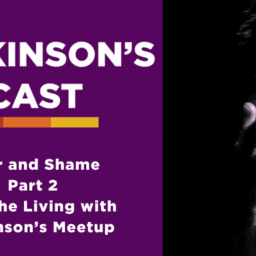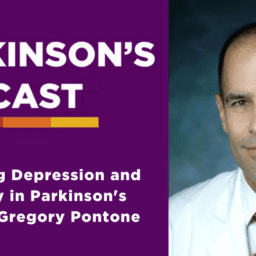Since 2020, the COVID-19 pandemic has exposed the myriad ways that structural racism and oppression affect healthcare and health outcomes, including well-being and quality of life. These same systemic issues plague the Parkinson’s community and result in care inequities and disparities that disproportionately affect people of color, women, people with limited English proficiency, and more.
In this conversation, Nicte I. Mejia, MD, MPH, FAAN, and Aswita Tan-McGrory, MSPH, discussed how these systems of racism and oppression affect our community, and how we can take these learnings and create the change needed to ensure all people can live well with Parkinson’s.
You can watch the video below.
To download the slides from this presentation, click here.
To download the audio, click here.
You can read the transcript below. To download the transcript, click here.
Melani Dizon (Director of Education and Research, Davis Phinney Foundation):
Welcome to out webinar today which is about health disparities and Parkinson’s, structural racism, and oppression. I am super happy to be here today. We have a great panel of experts on this topic. We have Eden Mussie who is part of our IDEA board and she’s also going to be moderating the conversation today, I’m going to be introducing her more fully in a minute. We have Aswita Tan-McGrory and she is going to be part of the conversation with Dr. Nicte Mejia, and Eden will do more thorough introductions of them when they come on. Right now, I just want to go through a little housekeeping before I hop off. If you want to let us know who you are and where you’re calling in from, feel free to open the little cat cion at the bottom of your screen and just say who you are and where you’re calling in from.
I’m also enabling closed captioning. If you like to see the subtitles on your page, please feel free to leave those up, if you don’t like to see them you can just click the little arrow where it says like live transcript or CC, and then say hide subtitle and you won’t be able to see them. Hi, Cidney, so great so great that you’re calling in from Las Vegas today. I actually saw you on Amy Says Dance this morning so it’s great to see you again here. Harrisonburg, Virginia, thanks Kate for coming on.
Let’s see a couple of other things. This webinar is brought to you by the Davis Phinney Foundation in partnership with Dance for PD so thank you so much Dance for PD for making this possible for us to have this really amazing series of webinars for our community.
The webinar will be one hour. We will also record it, when it is finished, we will send you the video recording, audio recording, transcript, and any show notes that we talk about during the session.
Leigh Cocanougher is our content manager, she’s behind the scenes today and she is going to be throwing up links, if we talk about something, a paper, or a site or whatever, she’ll throw those up there, and you don’t have to worry about jotting them down because we will be sure to share them with you afterwards.
Okay, I think that’s it, please feel free to use the chat. You can either chat all panelists and attendees if you want everyone to see if you just want the panelists to see and ask a question feel free to do that I’ll be behind the scenes, the whole time monitoring that. OK, so now I want to just introduce Eden so we can get moving. Eden Mussie is an equity advocate committed to holistic approaches and health for all people. She currently works as a health equity program manager at Blue Shield of California focused on building a shared understanding of health equity principles across the organization through tools, terminology, trainings, and assessments.
Another fun fact is that several years ago Eden was an intern for the Davis Phinney Foundation, and is now one of the charter members of our IDEA board. So great to have you here today, I love this for a full circle moment and feel free to take it away.
Eden Mussie (Health Equity Program Manager, Blue Shield of California):
Thank you so much for the introduction. Hello everyone, thank you for being here today for this very important conversation around structural racism and oppression in the Parkinson’s community.
We know in the last year or so it’s been very challenging and difficult, and we’ve unearthed and seen a lot of health disparities and health inequities that exists in marginalized populations and so we’re excited today to have two awesome panelists speak to us on this topic. We have Aswita Tan-McGrory, and she is the Director of the Disparity Solution Center and the Administrative Director at the Mongan Institute at Massachusetts General Hospital, and we have Nicte Mejia, who’s the Assistant Professor of Neurology at Harvard Medical School and the Director of Community Health Diversity and Inclusion at Mass General Neurology, and so what we have planned for today is that Aswita is going to walk us through a presentation for about 35 minutes and then that’ll be followed by a Q&A that all moderate with both Nicte and Aswita and like Mel had said please use the chat please put your questions in the chat, you know, we want to answer as many questions as we can by the end of this hour. And so, with that, I’m going to pass it off to Aswita to kick us off.
Aswita Tan-Mcgrory, MBA, MSPH (Director, Disparities Solutions Center and Administrative Director, Mongan Institute at Massachusetts General Hospital):
Thank you so much. Let me just take a second to do the share slides thing. Okay.
All right. Can you let me know if you can see the slides okay in presentation mode?
Melani Dizon: Yes, it looks great.
Aswita Tan-Mcgrory:
Okay, great. So, thanks, everyone, it’s really great to see. Make sure that if you have a question you put in your chat like that it goes to everybody, including the panelists I only saw a couple of inches of who you are and where you are, but I think it’s because you didn’t select panelists, so I’m just going to walk through, you know, Nicte and I have worked together for a really long time so it’s really wonderful to do a webinar with her about this.
And I thought, what would be helpful is if I just walked through some of you know some basic foundation setting about disparities and just a little bit about the Disparity Solution Center, we’ve been in operation since 2006, and where our focus is, is really on providing equity and clinical care, and making sure that we provide quality healthcare to everyone. And sometimes when people ask me what I do, I just say I work on racism in health care so let’s see if I can get this all going, there’s like 19 screens going on and here we go.
One thing I always like to do with these presentations, is just set some ground rules. I’ll just go quickly through them.
But some of the ground rules that help us have this conversation is one is value and respect the diverse perspectives and experiences in his room and given how national the audience is definitely I think that’s something we should think about. By listening actively with humility empathy and respect for the person sharing our experiences. Speak from your own perspective so us “I” rather than “we.” Avoid making assumptions about another person’s identity and engage in dialogue, not debate, so open-ended discussions really actively listening. For people who don’t usually talk about racism in diverse groups, this may not feel comfortable, and I will just be honest with you, the goal is not to feel comfortable.
You know, these are tough conversations to have, but what the goal is to gain a deeper understanding through listening and respectful dialogue. That is the goal. And so be open to learning from others but take responsibility for your own learning as well, so don’t expect people from marginalized groups to educate you on their experiences.
And then lastly share the air, so if you tend to dominate the discussion you know take a step back, or if you are more quiet, you know, challenge yourself to speak up so others can hear from you.
And then I wanted to just like set a definition for everyone. What is disparities? Because a lot of my friends and families is like what you do you do again? I think your work for Mass General? Then when I tell them what I do, they’re like well what does that mean, so I usually give the example of the first bullet here, is that if you go into an emergency room and you break your arm or you break your leg and you go to the emergency room, studies have shown that if you’re black or Latin-x, you’re more likely, or you’re less likely to get pain medication, even if you have the same insurance, same socio economic status. And people are always kind of surprised by that, that we have that in our healthcare system. But that’s sort of disparities. Gaps in the quality of care by race, ethnicity, socio economic status, sexual orientation, gender identity and or ability, and at the Disparity Solution Center we have really specifically focused on race and ethnicity, but there’s many other disparities.
And then this is just the cornerstone of the work that we do. One is this report that came out in 2002 by the Institute of Medicine which has been renamed to I think it’s the National Academy of Science, but it really said, you know, racial and ethnic disparities exist, there is no one root cause, and it is at the system’s level. It’s the provider and patient level and then it’s at the individual level.
And then the second report here is crossing the quality chasm. And if you look at the pillars of quality, there are six of them, and equity is one pillar, but in all honesty, if you look at all the pillars, you know equity can sort of walk across all of them so it’s like timeliness, effectiveness, safety, patient centeredness, you know, you can find an equity component in all of them. So, these are the two cornerstones of the work that we do, which is racial and ethnic disparities and then, you know, quality in healthcare.
And then since that report came out in 2002 how have we been doing? And overwhelmingly if you look at this graph, all you need to know is that blue means no change. So, meaning there has been no change in decreasing the disparities between poor versus high income, black versus white, Hispanic versus white, Asian, versus white American Indian, Native American actually AN versus white, too many letters, but blue just means there’s no change. There’s been some worsening and some improvements, but this is really complex and so we want to walk you through like why is this so complex if we, we have, you know, have the seminal report in 2002.
So, the first, you know root cause is really around data collection and so I wanted to start with a case study, and this is sort of always a bittersweet moment for me.
This is my oldest daughter when she was seven. She is now 15 have been using this picture for a couple years now and I can’t change it because I just love this picture. But when she was seven, she, you know I was doing a lot of work on collecting race, ethnicity, data in our system and I had this moment where you know your work life crosses over into your personal life, and she turned to me and she said Mommy, I’m Irish.
And so, I’m married to my husband’s Irish that’s the McGrory part and he was born and raised in Ireland. And I said, well, you know I’m Dutch Indonesian so I was like, well, there’s a little bit more to the story I was like you’re also Indonesian and you know we go to the Netherlands and she said, very, like, you know, seven year olds have very strong opinions she was like no Mommy, I am Irish, and I was like, you know, this is so interesting because if I was going to fill out the demographics for her, I know what I would put. Right?
But if you were to ask her, she would put something completely different which is what she just told me, and then I thought about it a little bit more. Now this is a picture of my daughter in Ireland, and I think you can tell which one is my daughter.
But you can see right away why she so self-identifies with being Irish, we go to Ireland probably every other year, we visit my husband’s family, his sister has a farm there’s animals there they can roam around free she has lots of cousins, you know, and then we live in Boston, which is, you know, sort of, the home of the Irish and St Patrick’s Day is a big day in Boston and we have some friends and family who are Irish as well and one of them used to own an Irish bar so we would always go to St. Patrick’s Day and it would be very much a family affair, so you can understand from her perspective, why she would so strongly self-identify with being Irish.
Now what’s interesting about this is that you know as she gets older and as she has gotten older, this has really changed, and I didn’t know that when I put this together but like her self identity has really changed and now she self identifies by is more with the Indonesian side with being a person of color of being mixed race. And I think a lot of this sometimes has to do with like if she needs somebody in Boston, who is maybe of Irish descent, and she says I’m Irish. They might take a look at her and say, you’re not Irish, I’m Irish my grandmother’s from Kerry, right? So really what I’m getting at is really important to always ask the person what is your race and ethnicity? And then this is my youngest one she’s now nine.
She has actually not really said anything about how she self identifies but I always like to bring up that you know, even though they grew up in the same family, and have the same experiences they might self-identify very differently.
And so, it’s important to ask and not make any assumptions. This is part of like why we see disparities because we need to have better data. And we need to have data that is self- reported, and that still is a problem in our country.
Definitely with like some of the big data that comes from CMS and Medicaid, we don’t have good reliable race, ethnicity data, and without data, it is difficult to take action so it’s really important that we, we do a good job of collecting.
And so, if you look at sort of the standard Office of Management and Budget categories OMB categories.
You see that they are pretty you know, narrow and probably my daughter’s if you were only allowed to select one would have a difficult time trying to figure this out and I would just say that we just had a discussion with the leadership at Mass General this morning, where, you know, the pediatric population is very diverse and things aren’t as clear cut and we cannot make an assumption that everybody neatly fits in one category.
But we have to do our best. And if we don’t do anything, we’ll have no data. So, some data is better than no data, but of course the standard goal is self-reported data.
So, this is just a, just an example of like why there’s a huge multi-racial population that’s growing, and that will see in our pediatric population. And that’s because the percentage of interracial marriages has doubled over the past 30 years.
Honestly, I was thinking about it this morning. That’s a very outdated concept that black people are going to marry black people and Asians are going to marry Asian people, and we can just continue that sort of very siloed category in the future, so I think we’re going to see some changes, and this is something that we need to have, we need to collect, but we also need to collect accurately.
And that’s just another chart. And then I would just say the second sort of challenge that we have is language barriers, so this is just some research that talks about patient safety so again one of those pillars right of quality and we show that if you don’t speak English very well, or, you know what we call patient with LEP, you will experience adverse events, more frequently and severely than English speaking patients and they’re more likely to experience medical errors and suffer physical harm.
And so, when I mean adverse events is like operating on the wrong hand or even falls, and this is around no communication, so it really makes sense like if there’s not a good way to communicate, you’re going to impact quality right, so language barriers is really important.
This is just a snapshot, we took a, as you probably know in Boston, back in April. We were in the midst of COVID surge. And I think we all still kind of have PTSD from that. And it is good to know that we’re moving beyond that, but what you’re seeing here is sort of some data graph of like services provided by our interpretive department which is quite robust and under the direction of Kris Carlon.
And so, what you see the bottom line here is video interpretations right and then the second from the bottom is face to face interpretation and then the top line is phone interpretation.
And so, what you’re seeing is that this huge drop in in-person face to face interpretation during April of last year.
And then you would assume that because we all moved our ambulatory services to virtual that you would see an increase in video interpretation, right, to match that drop in in-person, but actually we didn’t, it pretty much flat lines, maybe tiny bit up, and where we see a bump is in phone interpretation, which is not ideal. When you have an interpreter on the line it’s great if they can see the patient’s face if they can get the energy, and so part of this is the challenge of bringing an interpreter on into our system so it’s a systems challenge and I would say it’s structural racism in that sense that we build all these systems that can accommodate interpreters seamlessly. But also, it’s sort of like, you know, as a workforce we need to make sure that we provide for one group, so virtual visits, works for everyone.
And, in fact, what we found out it only works for people who have access to a smartphone or a computer, they’re tech savvy, right, they have a private space where they can have a virtual visit, and there’s no language barriers and so we’re really widening disparities. So, I would say language barriers, is another challenge that we see.
Trust is important, right in health care, and we have decades of building this trust. And I think in healthcare, we haven’t done a really good job in sort of examining how history has played a role in fact we kind of have blinders about the whole thing. And as we know if we don’t study our history, we can’t learn the lessons we just keep repeating them. What you see here is a picture of Boston Hope, which is, we turned our convention center into a large sort of bed discharge area for patients who had COVID. I think, at the height of the surge, and Mass General alone had like three to 400 COVID patients on 14 floors.
And so, we had to discharge them to make room for more patients once they were stable enough, but a lot of the patients were coming from the neighborhoods where they were like living in a multi-generational household.
And so, the importance of isolation, we build this kind of Boston Hope to help patients discharge and also homeless patients could go here, and you could get medical attention, really great idea.
But I think we kind of forgot and the hard lesson learned here is that mistrust is an issue in our communities, especially in our immigrant communities but also in our communities of color. This was done in coordination with state and they had it partially staffed by army.
And so, when you come in, you have to go through a metal detector and there was a guy in like army fatigues and so the word came around in the community like you do not want to go there it’s like another prison.
Right? And despite our best attempts we didn’t get ahead of that message. And we also had not really messaged it appropriately through trusted channels into the community to explain like what this was and who it was for.
So, while it was used, it wasn’t used to its full capacity. And that is a lesson that we learned the importance of having trust with the communities that we’re trying to serve.
And then this documentary which I think is really great the 13th documentary and I think a lot of people have seen it now especially in the last year is on Netflix and it really sort of documents, you know, the criminalization of African Americans and the US prison boom, and you really always have to ask yourself the question is who benefits from all of this, right, who benefits from incarcerating people of color and this is a really great documentary but it also speaks a lot to what is, you know, our historical precedent, and how we are just like how this impacts the trust that we have with communities. So, an important movie if you haven’t seen it. And then I would also just say like another root cause is bias.
We all have bias. If you tell me that you don’t have bias, then I would just laugh because we all have unconscious bias it’s a way that our brain makes quick decisions when you’re under pressure and you’re short on time, you’re juggling multiple things, it’s just a safety mechanism. Where we want you to pay attention if there’s bias if we’re not aware of it like how it plays on health care.
So here is a sort of a survey of 16,000 physicians, where they asked which patient characteristic triggers bias. And at the bottom it says race, and I will just say that the reason race is at the bottom is because I think we all know it’s not okay to say it, but language, as you can see is fourth from the top and it’s equal between male and female. And so, what this really tells you is that the providers are admitting that if I get a patient who doesn’t speak English very well, it triggers bias.
And I do think in this country we are very much okay with providing “less than” care to patients who don’t learn English, you know, in a way that I can understand and I would just say that bias exists because I’m from Holland, and when people hear that I’m from Holland and they’ve been there, they always say oh, I love Holland and it’s not ever about the art or maybe the good food, and I’m like oh why do you love Holland? And the number one thing they say is oh I love it because I can speak English, which is true, Dutch people speak very good English, but that is sort of the expectation right, that if you go abroad, that people will speak English and in fact I think this is why France sometimes gets like a negative reputation which is completely undeserved about how, you know, French people are not willing to speak English and sort of like not even speak to you in French if you try and I have not found that to be true, but that is out there. And so, we not only have an expectation of how well you speak English, when you come here also, we have an expectation of how well you speak English when we visit your country.
Knowing all the while that most people in America who are born here probably don’t speak any other language fluently, besides English so it is you know, something we need to be aware of this bias.
And so, the other thing that I think that’s another root cause is this referral to specialty care. We see this at Mass General, is that we see a lot of our patients of color in primary care, in OB, in pediatrics, in the emergency department, but we don’t really see them in the specialty care, so this is the most recent demographic data that we’ve sort of sliced and diced. And what you can see is that overwhelmingly we don’t see a lot of patients of color in our specialty care. We probably see the more in the community health centers, but still not a lot compared to white patients, so this access issue is something that we need to address.
And I think part of this also has to do with workforce diversity right and just like this issue, it’s helpful if your workforce reflects the demographic you’re serving.
And not only from an understanding of lived experience, but like, potentially being able to speak the language, or just making patients feel more at home, and having that trust. And so, people always tell me, oh it’s the pipeline, just like not a lot out there and so this is a shot from an internship program that we rapidly put together last summer during COVID, because there were not a lot of internship programs happening.
And it was 100% remote, and we specifically focused on students of color, but we also said, you know, any student who is first generation, going to college right or any student who has been on you know food assistance programs or any student who has been homeless. It wasn’t sort of like the standard underrepresented in medicine folks, and, you know, we’re Mass General so we, we have a great brand, and as you can see, it was just amazing, like we had over 350 applications we had to actually shut the application portal down early we had it open for maybe six days, and so this talks about like you need to be deliberate and you need to be clear about what you’re trying to do and you need to reexamine your existing processes.
Don’t just say like, it’s a pipeline issue right. So, it is important that we think about the workforce. And all of these students got to work with researchers and as we know there’s a lack of diversity in researchers, and that’s important for healthcare.
And so, we’re hoping to, to encourage them to go into research. And that also helps with recruitment in clinical trials right. I’ve seen this a lot I see a lot of teams that are trying to do community based participatory research to do outreach in black or Latin-x communities or immigrant communities, and yet when you look at their team or even the PIs, the leadership, the head researchers, they’re not diverse, so I just think that that is a huge gap that we need to address.
This is a screenshot of our center, and it has a lot of resources on it. And I think that’s the end of my sort of foundational presentation, and I think we were going to have a conversation, Nicte and I once I sort of set up the foundation and some of the root causes of disparities.
Eden Mussie:
Thank you so much for that foundation building Aswita, you know you’ve talked about data, the importance of data, making sure where we know who we’re serving and what their needs are all the way through to you know representation and who’s in the pipeline and, you know, who’s benefiting, asking yourself those questions and so I just want to remind everyone that they can put their questions in the chat and I don’t see any have come in but I have some of my own but I’d love to just before I get started with a question just Nicte, do you have any sort of reactions or just something you want to comment on first before I kick it off with any questions.
Nicte Mejia, MD, MPH, FAAN (Assistant Professor of Neurology, Harvard Medical School and Director of Community Health Diversity and Inclusion, Mass General Neurology):
Sure, and thank you for that presentation, it’s wonderful to have you here in this space. So, you know, I think a lot of this resonates in general as I think of neurology and neurology care, but it becomes so important for people living with Parkinson’s, and I’d love to touch up on one part in particular, which is the concept of bias.
Because Parkinson’s disease compared to other conditions. There is not a blood test, there is not an imaging test that tells you 100% someone has Parkinson’s disease. So, it’s really important for us as clinicians to listen to patients, and to examine them carefully and put those two things together. And I think that that makes it a little bit more vulnerable to the problem of bias.
I know there was also a question in the chat about access to care, and the segregation of our healthcare system, and I think you know there’s certainly segregation of the healthcare system and in large cities and across the country if you look at urban and rural, and this definitely exists across specialty care like Aswita mentioned, including neurology and probably neurology worse than other specialties like if you think of obgyn and pediatrics, probably much more represented in the community. And we do have programs that are being intentional about having neurologist and community health centers at Mass General Brigham we now have three neurologists across four community health centers in our network.
Mass General also has a partnership with hospitals across Maine, New Hampshire, and Massachusetts to provide emergency room in-patient and ICU care in community hospitals where usually there’s not a neurologist. That unfortunately is still missing the outpatient part which is usually where people need an outpatient neurologist so it may be that through some of the second part of the initiatives, people living with Parkinson’s may meet a Parkinson’s neurologist or be diagnosed with Parkinson’s, but then that continuity to being seen by an outpatient physician who specializes in Parkinson’s isn’t always there.
And, and, you know, I’ve had primary care doctors asked me in the past, so does it really matter? What if people living with Parkinson’s ends up being cared for by a primary care doctor? Is there a difference? And there’s plenty of data in the Parkinson’s disease literature, showing that it does, that if you live with Parkinson’s, and are receiving care by a Parkinson’s disease expert at least once a year, you are overall more likely to do better and there’s two things that stand out. One, you’re probably less likely to fall and have a bad fall for example have a fall with a fracture like a hip fracture, and two, you’re more likely to have non motor symptoms identified like depression, and then treated and both falls, and mood are primary drivers of quality of life.
So, it does matter, it makes a difference to see an expert in Parkinson’s disease, and I hope that as a community we become more intentional about fostering access to Parkinson’s disease care, both in rural and urban settings, thinking of those hospitals and clinics where usually there’s no access to neurologists. Thanks for that presentation, I don’t know if you have other thoughts about this Aswita.
Aswita Tan-McGrory:
Yeah, I was just thinking about the first thing which is like anytime in sort of subjective as to who gets diagnosed a certain way, we set up a system where like, we, you know, it can go into bias, we see that when we look at process measures so things like taking aspirin versus like anything that relies on communication and the clinician or patients perspective of making a decision like flu vaccinations right those are harder because that the physician has to offer it, and the patient has to accept it versus like taking aspirin so I think that’s a good sort of observation you make and then this other thing. There was a study that was published by people at the Brigham that looked at referral to a cardiologist for black patients and what they found is that, you know, if you were a black patient you were referred to sort of like just the regular care right back to primary and if you were white patient you’re going to go to the cardiologist.
And so, I was just thinking that when you mentioned that idea of like you know primary care physician care versus a specialist. Yeah, isn’t it the same? And it’s like no it’s not the same, and like, but this is the bias in our system, and I will just say like I had a conversation with a physician the other day and he was like well, isn’t there is there like one intervention that we can just do for everything?
And I was like, well I thought about it, and I was like, I think any intervention that reduces the bias will demonstrate results right, like a lot of times the interventions are about like navigators and all of that is good, but anything that can reduce the unconscious bias in the processes is probably going to demonstrate a larger reduction in disparities. So, I think, I think that’s comment I would make.
Nicte Mejia:
Thank you for that I was just gonna say that a few years ago a medical student working in our clinic led a survey of movement disorders specialists across the country.
So, it was physicians and nurses and physical therapists, anyone working at a Parkinson’s disease clinic. And one of the questions they were asked was around bias, and it was very interesting for me to hear your data around physicians acknowledging or not, that there may be bias, about half the sample in this survey, people said that yes, they thought that there was bias when it came to patients cared for in their clinics, based on race and ethnicity and when it came to language about half of them observed that there were gaps with regards to the materials that they had available in languages other than English, which I think is also a structurally racist problem that that we can certainly change.
Eden Mussie:
Thank you both. A question that I’m seeing around COVID, I think I want to ask sort of a pre question and then we can lead into that but sort of how has it impacted the Parkinson’s community, particularly communities of color, and maybe if you could start there, and then we can go into a question about sort of vaccinations and maybe some of the vaccine hesitancy and a question that’s in there as well.
Nicte Mejia:
I’m happy to take that that question. You know, as you know, COVID has amplified inequities in our world, so not just across the United States.
If you take all of that country, and you look at you know who’s more likely to be infected by COVID, be hospitalized with COVID, die from COVID, black and indigenous and Latino populations are two to three times overrepresented. When you think about people living with neurologic disorders, there’s a you know wealth of initiatives looking at symptoms and including neurological symptoms. And as part of those efforts, a few of the studies have collected data on race and ethnicity, and I cannot emphasize enough, what Aswita said that data matters, any data matters.
And if you look at all the research about COVID and its intersection with neurology, unfortunately most of it does not collect or at least does not report in this studies race and ethnicity data, but when they do, ah, it’s very helpful because it’s helped us identify disparities. One example of this, Michael J Fox Foundation, did a survey at the beginning of the pandemic to ask people living with Parkinson’s what their experiences have been so far.
And they asked all sorts of questions, including whether they had, you know, suffered COVID or how their care had changed. In general, if you took everyone who responded and I should note this was an electronic survey, people tended to say you know it’s harder to reach my doctor, it’s harder to get refills. I’m having trouble finding exercise programs.
But if you then analyzed data. They had collected information about people’s income, annual income. And so, you could analyze the data by income and lower income respondents had twice as much troubles with all of the problems regarding access to care.
Unfortunately, when it came to race and ethnicity, very few people of color answer that question. There was a hint there, that they were part of the people who were having more problems, but statistically it was so few people who answer the questions that you really couldn’t make much more conclusions beyond that.
So, I think it highlights two things. One is, in general, the Parkinson’s community is experiencing challenges with COVID, whether they got sick, or that the challenge is everyone is facing around access to care, but two, you know, the resource that we have available can make it even harder if there are gaps with regards to access to a computer, access to internet, literacy when it comes to using email and other resources that now we are we are using so much.
Yeah, I will just say you know the great thing, well, it’s not the great, it’s the silver lining of COVID has been that people all of a sudden, have taken notice of disparities in a way that they have not before, and part of the reason is because everybody is affected by COVID right. It’s not like only people with cancer or only people with diabetes, everyone, if we didn’t solve the problem for everyone, it’s still a problem for everyone. So, we all of a sudden people wanted to know the communities that are disproportionately impacted. And then they saw the challenges of like as Nicte said, like people that can’t self-isolate, people who have language barriers, so that has been great.
I will just say that like, you know, I think there’s been a lot of movement. And then, you know, I think we’re trying to take advantage of that, but we have a long way to go in this country and so when somebody says to me well when do you know that you’ve reached the goal of equity. I just say you know this is a journey. And yeah, the goal is for everybody to get, you know, equitable care.
I don’t know that we’ll ever get there, same way that you, you know, safety is a goal, but you tried to reduce and minimize harm, you try to do as much as possible.
This is a journey that we’re on, and it’s going to take an overhaul of our system and not just healthcare. We got to look at all the other things prison, we gotta look at educational system.
You know, there’s a lot. It’s complex.
Eden Mussie:
Thank you. Yeah, it’s absolutely complex there’s so many levels that are impacting it and systems that are a part of our health care and health systems.
So, we have a question here. Going back to representation in workforce. So, the question is when working to create a workforce group of volunteers for example, who are diverse and representative of the communities that we serve, what advice you have to be direct and clear in your outreach without tokenizing or isolating the particular group that you’re trying to reach right? How do we make sure that you know we’re not tokenizing communities of color or other marginalized groups, but also making sure we’re intentional, like you mentioned, so do you all have any strategies or thoughts about that?
Aswita Tan-McGrory:
Yeah, and this goes a lot, you know, because I think people are always saying, oh, we should, you know, work with the communities but, you know I’ll take research as an example right, a lot of time researchers will go into a community and they have a clear agenda of like what they want from the community, and what they think the community needs, and they never ask, and then they wonder why their recruitment efforts are so low.
And it’s really about like, it would be better if you went into the community and said I want to hear what are some of the challenges that we can try and help you with, right, it goes back to building that relationship and that trust and understanding better like what the community wants, and this may have nothing to do what you think you want to achieve, right, and maybe about crime rates, or maybe it’s daycares but if the institution or the group tries to address that.
That is how you build sort of a quid pro quo relationship like it’s very one sided, and then the other thing I would just say is that, you know, I think, I don’t know that we do enough just being in the community is not enough, right, like you have to historically look at your own organization or group that you’re coming from, and not think about how you think you are in the community but ask the community, the elders, like what is your perception of Mass General Hospital?
There’s a speaker that I brought up, who was born and raised in Boston and he’s black male doctor physician and he brought his whole family like all of his siblings to the talk and they were all older than me and he was the baby so they were like in their in their 60s and 70s, and you know but back when they were born segregation was commonplace like in the hospitals. And so, when I had a conversation with them, they said, this is the first time I’ve ever actually been at Mass General. Now they’ve been in Boston their whole entire life and I was like really? Yeah, I’ve never felt like it was a hospital for me. But that’s important for us to know. I think at Mass General we think that we do a great job, but we don’t actually check with the community to see like what might have been the role that we’ve played in their community and what is the perception of the community. So those are the things that I think we need to do but oftentimes there isn’t time to do that important sort of trust building, or we just want to get straight to the like things that we need.
Eden Mussie: Absolutely.
So, the co-design one listening first, but also like working with community, not, you know, for community. Another question that has come in is around referral bias. So do you have any strategies for communities to change the issues with referral bias. This is a common problem for Parkinson’s, I think.
Aswita Tan-Mcgrory:
Yeah, and I’d love to hear what Nicte says but I think the approach that we’re taking at Mass General in addressing sort of the access to specialty care is we literally are taking the data and looking at it and holding groups accountable right, departments accountable. Like here’s the demographic of the patients that you serve. We know this disease is a challenge in communities of color, why aren’t we seeing more people so for example orthopedics tends to be mostly white folks who go see them. And, I mean, if you think about like my husband’s in construction, like he needs an orthopedic surgeon. And so, if you think about who might see an orthopedic surgeon or need to see it as somebody who does a lot of labor-intensive work.
Right. And that would be like in this country overwhelmingly the communities of color the immigrant community so why are we not seeing them in our offices and yes like access is tied to payment, you know, but that’s not the full story.
So, I think those are the things that we need to examine, and we can start with data.
Nicte Mejia:
I think you know that that resonates with me. We need accountability and transparency and that requires data, constantly. And I can tell you that, you know, there’s probably several interventions that need to happen at once to broaden access to neurology care in general. One is certainly this idea of partnering with community health centers, whether it’s to offer neurology care in person or neurology care through telemedicine now there’s all sorts of formats, whether it’s starting with an e-consult, which is something on paper between clinicians to doing a video visit with a person.
These are these are, you know, some of the strategies that eventually, hopefully can get a person from primary care to a neurologist, to a movement disorders neurologist, if you take a step back and look at national data, one of my colleagues Altaf Saadi and I did a study a few years ago, looking at data for the medical expenditure panel survey that takes everyone across the US regardless of what kind of insurance they have or if they’re don’t have insurance, and what we saw there is that if you are black, living in the United States, with a known neurologic disorder, you’re 30% less likely to be seeing a neurologist as an outpatient and if you’re Latino that increases to 40% less likely. And again, having a known neurologic disease. And when you look at what happens to patients, most of them, if and when they see a neurologist or receive neurology care it usually happens in the emergency room, or when they’re in patients. And so we really need to be intentional about thinking of how can we broaden access in general to neurologists in the outpatient setting, and then ask the question and how can we then also be intentional about increasing access to movement disorder specialist, and you need to then take it up a notch and say, and it’s not just the movement disorders doctor that you need, you need physical therapists working in the community, you need neuropsychologists working in the community at you need neurosurgeons working in the community, because if you your hope your vision is to give excellent Parkinson’s disease care, you need to be thinking of the spectrum of care, including access to Neuro therapeutics like deep brain stimulation.
So, part of it is the neurologist but there’s a lot more behind.
Eden Mussie:
We have a question going back to community, how can community leaders ensure that they are listening to the right people in their community and not creating an echo of focus and non- inclusive issues?
So perhaps this person is saying, you know, how do we make sure we’re listening to the right, folks, and maybe creating an inclusive space for that?
I know you touched a little bit on building the trust and listening but anything else to speak to that?
Aswita Tan-McGrory:
Well, I’m just going to be frank with you. This is where a diverse workforce is helpful, and with diverse I mean people can speak from a lived experience. And so, you know I think oftentimes we think what’s enough, is if we have leaders who are committed to it, and speak about it, and that is helpful right, they can open the doors, put the money behind.
But we need leaders who look like communities of color who can go to these leaders, but who also understand the challenges the community has, you’re more likely to listen, if you can sort of identify with these challenges. If you’ve always had access to resources. You’ve never grown up hungry. You’ve never been afraid of the police. You’ve had good education, how are you going to listen to a leader in the community, you’re speaking from one lens.
And so, I do think it’s important that we balance our leadership, and when leadership is balanced, these kinds of conversations look very different when they start going into community, and they listen to the leaders and then likewise the leader see like oh, you’re from the community, you know, let’s talk. So, I think that is really missing.
And all of this as well intentioned, so I’m not making any judgment on people. Well intentioned, but at the end of the day, you can’t talk about hunger if you’ve never experienced it.
Eden Mussie:
There are two more questions that I want to sneak in before we close out, I know we’re coming to the end of the hour, but one is I think going back to the data piece that you know you all have are really hitting that home data is important and we talked about race and ethnicity collection and but we also talked about language as well. Are there other things that we should be looking at and thinking about, particularly within the Parkinson’s community?
And you know, maybe even beyond care and access, are there other perhaps community level drivers or system level drivers that we can be looking at from a data perspective?
Aswita Tan-McGrory: Nicte?
Nicte Mejia:
Yeah, the two that immediately come to mind. One is ability and that becomes very important if you think about Parkinson’s disease, certainly, you know you can get Parkinson’s as young as 20, 30, 40 but most people will have it as they grow older 60s, 70s, 80s being very conscious and intentional about asking and documenting needs around hearing, around vision, those things matter when we think about providing equitable care.
We have a wonderful disability program at MGH, and we’ve asked them over the years to come to our clinic and look at our spaces and give us recommendations of what needs to be improved. And we’ve made the clinic better thanks to them, make sure that wheelchairs can fit in the different spaces for example. So, ability I think is very important.
We haven’t talked about gender and gender identity. And I believe that also matters for everyone, but I think there’s a huge gap around this in the Parkinson’s disease world. And, again, people living with Parkinson’s have care partners have other people in their life helping them navigate their health and it’s important to be inclusive and thoughtful.
Some people may need to, you know, transition into nursing homes or other living environments. And this often comes up when you think about differences in gender and how accessible or not these facilities will be.
And then, the list goes on. I can think of patients for example who’ve gone into respite care at nursing homes for example, and they have certain religious, you know dietary needs, and at the places they’ve gone to have been not prepared at all.
I also think of patients who’ve had palliative care services come into their homes, and again here the issue of race and who’s coming into my house and will I be discriminated against in my own house. If the team coming in is not diverse so if you think, those are the things about those are those are the things that quickly come to me as things to emphasize within the Parkinson’s community but I’m sure Aswita, there’s more that I’m missing here to add.
Aswita Tan-McGrory:
I mean we’ve covered a lot. So, I would just say data is important, access, unconscious bias, you know trust. All of those things, I think education is a big piece of this. And just, you know, really having a clear understanding of, you know what does the demographic look like.
But I don’t know that I could add any more at the moment, I feel like we’ve been pretty comprehensive. Yeah.
Eden Mussie:
I think given time with that, I’ll just say, is there a final like one takeaway you would love the listeners to take with you just thinking about systemic racism and oppression and specifically you know to those on the call, probably providers, practitioners, or just leaders in the space who really do want to dismantle or begin to dismantle the systemic barriers so if you could give them one takeaway.
Aswita Tan-McGrory:
Well, I have this sign. That was from last summer when we did a stand in for George Floyd and it says, do the right thing, get uncomfortable.
Be anti-racist. So, my advice to you is the hard work starts with yourself, we can talk systems all we want. But if you yourself aren’t doing the hard work by looking at your own role in this, your own privilege and I speak to everyone.
So even myself I’m still constantly learning, this is a journey that all of us take and don’t be afraid to be wrong, like you know, don’t let the perfect be the enemy of the good but just get ready, be uncomfortable.
That would be my advice.
Nicte Mejia:
I love it I you know that all of that resonates with me, I would add, you know the Parkinson’s disease community is behind other communities, in the world of equity, so we all need to engage and partner to foster change.
Eden Mussie:
Thank you both. This has been such a great conversation, I’m going to now pass it off to Mel, who’s just going to close out the webinar for us.
Melani Dizon:
Hello. Yes, thank you so much Eden, this was fabulous. Thanks for being our moderator. Thank you Aswita and Dr. Mejia, thanks for being here today and really giving us a lot to think about.
I like to thank Davis Phinney Foundation and Dance for Parkinson’s, sorry Dance for PD for partnering together to make this possible, please reach out if you have any questions on health disparities any of the series that we are hosting, you can speak with Jenna, and I just put her email in the chat box so please reach out to her at any time. We have another webinar coming up on June 29 for the LGBTQI community with Parkinson’s, and to talk about some of those inequities.
Show Notes
- It is important to ask others what they consider their race and ethnicity to be, as their unique experiences contribute to their identity and may not be apparent from the outside. For the same reason, there’s a need for more opportunities in data collection for self-reported race and ethnicity
- When we speak of health disparities, we are talking about the differences in the level of healthcare received based on population characteristics such as race, ethnicity, gender, socioeconomic status, and more
- Patients with language barriers or LEP (limited English proficiency) are much more likely to experience a decreased quality of care, more adverse events, medical errors, and to suffer physical harm than patients without language barriers
- The importance of building trust, particularly in immigrant communities and communities of color, is an important consideration when working to decrease healthcare inequities. When attempting to build trust, it’s important to look to the past to consider why and where distrust may exist and to diversify your workforce so that you are representing the community you serve
- Data indicates that people of color are much less likely to receive specialty care as opposed to the care of a general practitioner. This speaks to inequities in specialty healthcare access and referral. Some facilities have begun to include specialists such as neurologists in community healthcare centers, which may be a good first step in decreasing these disparities
- Equitable quality of care is particularly important in the diagnosis of Parkinson’s, as the diagnosis comes not from a simple blood test but from a comprehensive review of multiple symptoms and considerations
meet the panelists
In her role as Director at the Disparities Solutions Center, Ms. Tan-McGrory leads the Center’s portfolio of projects focused on addressing racial and ethnic disparities in health care. Ms. Tan-McGrory also travels across the country to speak to organizations about how race, ethnicity, and language impact the quality of care. Ms. Tan-McGrory serves on several executive committees, including the MGH Diversity Committee, and the Mass General Brigham Health Equity and Quality Committee. In addition, Ms. Tan-McGrory sits on the board of the Massachusetts Public Health Association and is Adjunct Faculty at Northeastern University. Ms. Tan-McGrory currently serves on the MA Executive Office of Health and Human Services’ Quality Measurement Alignment Taskforce.d
Born in Guatemala and raised in Mexico, Dr. Mejia graduated medical school with honors from the Monterrey Institute of Technology. After conducting clinical research in movement disorders at Baylor College of Medicine, she trained at MGH/BWH/Harvard, completing a Medicine internship, Neurology residency, Movement Disorders fellowship, Master degree of Public Health, postdoctoral fellowships in Neurostatistics & Neuroepidemiology and Mental Health Policy, and the Physician Leadership Development Certificate Program. Dr. Mejia also graduated the Disparities Solutions Center Disparities Leadership Program, YW Boston LeadBoston Executive Leadership Program, Partnership BioDiversity Fellowship Program, and American Academy of Neurology Diversity Leadership Program.
Dr. Mejia works to advance equity through patient care, research, education, and administration. She leads the MGH Neurology Community Health Diversity and Inclusion initiatives, directs the MGH Youth Neurology Education and Research Program, is editor of the Neurology journal specialty site on equity, diversity, and inclusion, and serves as member of the Board of Directors of the Boston Health Care for the Homeless Program. Her work has been recognized with the HMS Harold Amos Faculty Diversity, Boston YMCA Achievers, Dominican Medical College New England & Hispanic Health Professionals Association Outstanding Healthcare Professional, MGH Service Excellence Leadership Honorable Mention, MGH Ernesto Gonzalez, HMS Scholars in Medicine Excellence in Student Mentoring, and the AAN AB Baker Teacher Recognition awards.
Moderator
An equity advocate committed to holistic approaches to health, Eden Mussie is passionate about improving health outcomes for marginalized communities. Eden currently works as a Health Equity Program Manager at Blue Shield of California focused on building a shared understanding of health equity principles across the organization through tools, terminology, trainings, and assessments. She holds a BA in Psychology from Carleton College and an MBA from the University of St. Thomas, where she received a certificate in Transformational Change and Organizational Development.
Prior to her current role, Eden worked on advancing health equity through grantmaking at the Blue Cross and Blue Shield of Minnesota Foundation and was a The Victory Summit® event intern at the Davis Phinney Foundation. She has also consulted on various projects focused on diversity, equity, and inclusion. This work has included organization development consulting with the University of St. Thomas focused on making higher education more equitable and strategy consulting with Imagine Deliver, a B Corporation focused on developing solutions for the new majority by centering the most marginalized end user and co-designing alongside them.
Learn More about Health Disparities and Parkinson’s
We created our Health Disparities and Parkinson’s Webinar Series as part of our commitment to understanding and working to change deeply rooted inequities in healthcare that black, brown, and indigenous communities; LGBTQ+; immigrant, and refugee communities; and people of color experience. Watch past recordings and register for the next webinar in the series here.
Presented in partnership with:




 Aswita Tan-McGrory, MBA, MSPH
Aswita Tan-McGrory, MBA, MSPH Nicte Mejia, MD, MPH, FAAN
Nicte Mejia, MD, MPH, FAAN Eden Mussie
Eden Mussie













